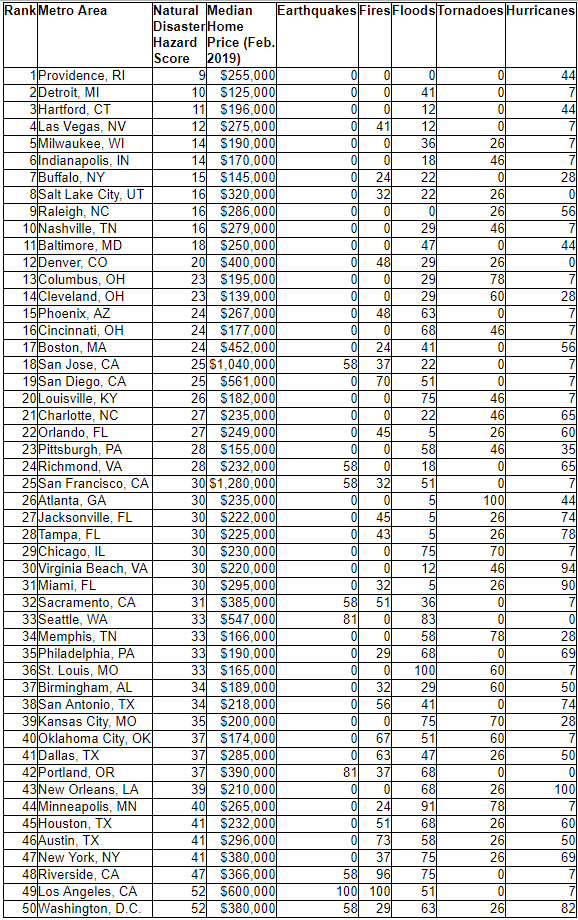You are viewing our site as an Agent, Switch Your View:
Agent | Broker Reset Filters to Default Back to ListDetroit, Indianapolis and Buffalo Among the Least Disaster-Prone and Most Affordable Places to Live
April 12 2019
Redfin Analysis Uses "Natural Disaster Hazard Score" to Rate the 50 Biggest U.S. Metro Areas by Frequency of Earthquakes, Fires, Floods, Tornadoes and Hurricanes
SEATTLE, April 11, 2019 -- Providence, Rhode Island, Detroit, Michigan and Hartford, Connecticut are the least disaster-prone metro areas in the country, according to Redfin, the technology-powered real estate brokerage. In a new report, Redfin rated the 50 biggest metro areas according to their relative frequency of five major types of natural disasters—earthquakes, fires, floods, tornadoes, and hurricanes—using a new metric called the "Natural Disaster Hazard Score."
Each of the five components is measured on a scale of one to 100, where 100 is the most hazardous metro area for the category and one is the least hazardous. The overall Natural Disaster Hazard Score is an average of the five components' frequencies.
Metros with low Natural Disaster Hazard Score ratings tend to have relatively affordable housing markets. Nine of the 10 least hazardous metro areas have median home prices below the $287,400 national median. Salt Lake City is the exception, ranking as the eighth-least hazard-prone metro area with a Natural Disaster Hazard Score of 16 and a median home price of $320,000.
Many of the most disaster-prone metros, including Washington, D.C. (52), Los Angeles (52) and New York (41), have home prices well above the national median. These three areas also tend to be near the top of Redfin's list of origins common among online home-searchers looking to relocate to more affordable, inland housing markets, like Las Vegas, which ranks fourth among the safest-rated metros.
"When you buy a home you are paying for more than just the house," said Redfin chief economist Daryl Fairweather. "There could be hidden costs associated with natural disasters. If a natural disaster strikes, you may have to pay for damage to your home or for the cost of evacuating your family. And even during times of calm, you may still need to pay for insurance against floods, fire, or earthquakes. Some homes in more hazardous areas might seem more affordable if you are just looking at the sticker price, but they may end up costing more when risks related to natural disasters are factored in."
In addition to high home prices in cities like Washington, D.C., Los Angeles and New York, the likelihood of natural disasters may be another factor driving homebuyers away from the coasts. When hurricanes, fires, earthquakes and floods are factored into the equation, the affordable inland metros are even more attractive destinations.
Below is a ranking of the 50 largest metro areas from least-to-most hazard-prone, according to Redfin's Natural Disaster Hazard Score:

To view the full report, complete with methodology and an interactive map, please visit: https://www.redfin.com/blog/natural-disaster-hazard-score-by-metro-area.
About Redfin
Redfin is a technology-powered real estate brokerage, combining its own full-service agents with modern technology to redefine real estate in the consumer's favor. Founded by software engineers, Redfin has the country's #1 brokerage website and offers a host of online tools to consumers, including the Redfin Estimate, the automated home-value estimate with the industry's lowest published error rate for listed homes. Homebuyers and sellers enjoy a full-service, technology-powered experience from Redfin real estate agents, while saving thousands in commissions. Redfin serves more than 85 major metro areas across the U.S. and Canada. The company has closed more than $85 billion in home sales.









